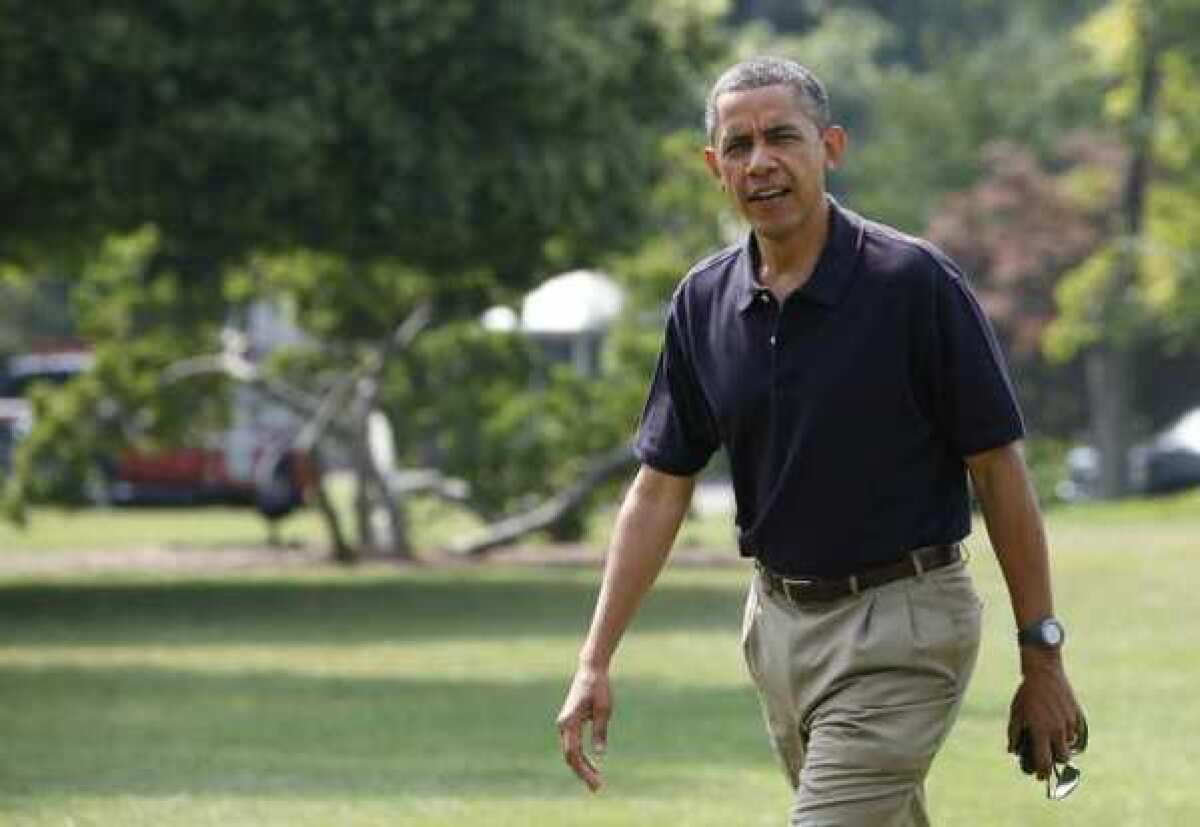Goldberg: What’s behind hatred of Obama?

- Share via
What drives Barack Obama’s “haters and doubters”?
So asks Obama biographer David Maraniss in a recent op-ed article for the Washington Post. By haters and doubters he means the people who think Obama wasn’t born in the U.S., that he’s a secret Muslim or that he’s a closet socialist.
He has an answer. “Some of it can be attributed to the give-and-take of today’s harsh ideological divide. Some of it can be explained by the way misinformation spreads virally to millions of like-minded people, reinforcing preconceptions. And some of it, I believe, arises out of fears of demographic changes in this country, and out of racism.”
COMMENTARY AND ANALYSIS: Presidential Election 2012
True enough! Some people are no doubt driven by such motivations and anxieties; “some” is a gloriously accommodating word.
But that hardly settles things. For an essay titled “What Drives the Obama Doubters and Haters,” Maraniss offers no explanation until the last paragraph (the quote above). And even then he offers no evidence, just assertions.
I think Maraniss is a great reporter, and I don’t believe for a moment he is in on a cover-up of Obama’s “real” place of birth or his secret Muslim faith. (Nor do I think either allegation is true.)
As to Obama’s closet socialism, I’ve never found it unreasonable (never mind racist) to think Obama’s more comfortable with European-style social democracy (aka socialism).
Still, let me add two culprits to Maraniss’ list: The first is Barack Obama. The second is the journalistic establishment that worked so hard to get him elected.
As Maraniss demonstrates quite effectively in his book,”Barack Obama: The Story,”Obama’s identity has long been a cultivated political project. Much of the poetic license — to use a kind phrase — Obama deploys to tell his own story is plausible only to those eager to take him at his word.
Maraniss couldn’t authenticate Obama’s tales of racial hardship as a young man. His grandfather being tortured by the British, the bigotry of his high school basketball coach? Untrue, no matter what Obama believed.
Moreover, Obama’s explanations about the aspects of his past that have managed to become controversies have always seemed insufficient to people not disposed to root for him. Bill Ayers — a former domestic terrorist — was “just a guy living in my neighborhood.” Obama’s word that he wasn’t a member of the radical New Party was enough for the press corps to stop digging for evidence that he was (as reported by my National Review Online colleague Stanley Kurtz).
Even Obama’s more recent embellishments about, for instance, being outspent and outgunned in his previous political races strike many people as the sorts of fibs that would create journalistic frenzies if uttered by a Republican.
And then there’s the huge divergence between the president Obama said he would be and the president he’s actually been. In 2008, Obama insisted that he was a unifier, a pragmatist and a non-ideologue. You don’t have to be a birther or a secret-Muslim conspiracy theorist to feel like that was all a big con job. That’s politics and not deceit (a subtle distinction!), but dismay at how Obama has governed doesn’t amount to racial panic either.
Yes, Obama also signaled to his base that he intended to be a “transformative” president, a progressive Ronald Reagan. But that message was intended only for his base. Whenever conservatives picked up on those notes — when he said he wanted to “spread the wealth around,” etc. — the immediate response from the Sunday talk show crowd was that conservatives were being paranoid for misreading Obama, the pragmatist.
It’s fine to beat up on conspiracy theorists, but journalistic muckety-mucks who are mystified by their ever-shrinking credibility — and profitability — might wonder what they’ve done to fuel a climate of distrust. There’s a reason whyABC’sJake Tapper is one of the few nonconservative reporters respected on the right: He’s stayed as skeptical of Obama as he was ofGeorge W. Bush.
Meanwhile, it’s fascinating how much attention the conspiracy theorists get. It’s almost as if some journalists want to use them as bogeymen to discredit all criticism of Obama. That’s some journalists, not all.
More to Read
A cure for the common opinion
Get thought-provoking perspectives with our weekly newsletter.
You may occasionally receive promotional content from the Los Angeles Times.











